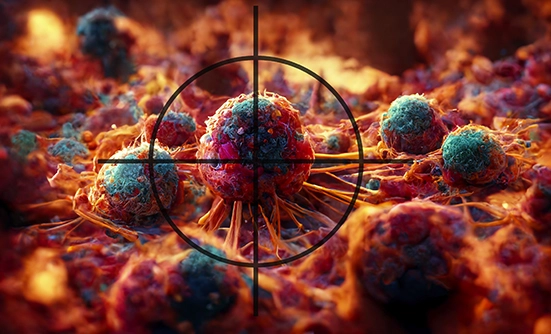Oncology is in its ugly duckling phase. For decades, the standard of cancer treatment—chemotherapy and radiation—has killed healthy cells along with cancerous cells. Now, with advances in genomic testing, oncologists have new tools to treat patients with treatments called “targeted therapies” that target the tumor based on the specific features of a tumor and spare other cells, thereby reducing the treatment’s side effects.

CONQUER magazine discussed the benefits of biomarkers and genomic testing with several oncology experts.
“We are definitely at a transition point. The way we conduct clinical trials hasn’t caught up with the science,” said Pauline Funchain, MD, Medical Oncologist and Cancer Genomic Medicine Fellow at the Cleveland Clinic in Cleveland, Ohio.
“We’re starting to look less at where tumors came from in the body, and more at what the tumor’s molecular characteristics are,” Dr. Funchain said.
Genetic versus Genomic Testing
The terminology can be confusing. People often use genetic and genomic testing interchangeably, but there are important differences between these tests.
Genetic testing looks at the genes that patients inherit from their parents that may increase their risk for certain cancers. According to the American Cancer Society, about 10% of cancer types have an inherited genetic component. Well-known examples are the hereditary genes BRCA1 or BRCA2 that increase the risk of breast and ovarian cancer, and the mismatch repair-deficiency (dMMR) DNA changes that can lead to Lynch syndrome, which increases the risk of colorectal cancer and other cancers.

“We use genetic tests to screen patients with hereditary forms of germline mutations, which, in turn, influence if we give risk-reducing surgeries or treatments to lower the patient’s chances of getting cancer in the first place,” said Mia Levy, MD, PhD, Director, the Sheba Foundation Cancer Center, Rush University Medical Center, Chicago, Illinois.
Genomic testing, by contrast, identifies the specific pattern of genetic or DNA changes (or mutations) within the tumor. It can be used to predict the patient’s prognosis based on those changes, as well as to determine how the cancer will respond to targeted therapies or immunotherapies.
Once such gene mutations—or biomarkers—have been identified, researchers can develop new therapies to target the mutation that is involved in the cancer, to attack it. One of the first targeted therapies developed was the drug Gleevec (imatinib), which specifically blocked the BCR-ABL tyrosine kinase protein, a biomarker involved in chronic myeloid leukemia (CML). Gleevec prevents the BCR-ABL fusion genes from continuing to grow and divide, thereby killing the cancer.
“CML would putter along in people’s bodies, then all of a sudden, go to blast crisis and people would die,” explained Dr. Funchain. “With targeted therapies like Gleevec, people are surviving for years and may never go into blast crisis.”
Types of Genomic Testing
Oncologists use genomic testing in 3 ways: prognostically, diagnostically, and predictively to understand the tumor and decide on the best approach to therapy.
Prognostic testing informs if the patient will have a good or worse outcome, but it is not helpful for extending the patient’s life or improving the quality of life through medication. For instance, oncologists use a prognostic test to know whether uveal melanoma (cancer in the eye) is likely to metastasize (spread). Prognostic testing mainly helps a physician plan how aggressively they will do surveillance imaging on the cancer, and how suspicious they will be if they see something unusual on a CT or MRI scan.
“Prognostic testing lets us know if the tumor is high or low risk, which ultimately informs us of the aggressiveness of the treatment, but not whether a specific targeted drug can be used,” said Dr. Levy.
Diagnostic testing, currently in its preliminary phase, helps oncologists to detect cancer early, determine the tumor type (or site of origin), and track residual disease through high-sensitivity blood tests. Mostly, diagnostic testing can help with hematologic malignancies (blood cancers), in brain tumors, and with some types of sarcomas and melanomas.
Given the high number of genetic changes that can occur across tumor types, Dr. Funchain says that knowing where a specific kind of cancer came from doesn’t occur that often. However, genomic testing was helpful recently with one of her patients who had skin and eye melanomas.
“These 2 types of melanoma are treated in completely different ways. We did genomic testing and found there was a genetic mutation in the eye melanoma, but not the skin, and that led us to the right course of treatment,” Dr. Funchain said.
Predictive testing, similar to diagnostic testing, identifies tumor biomarkers, which helps oncologists to select the best targeted therapy or immunotherapy for an individual patient.
Biomarker-Guided Treatment Selection
Biomarkers inform physicians on the likelihood of the tumor response to a given immunotherapy or a targeted therapy that treats that biomarker, as in the case of Gleevec in CML, or how EGFR mutations in non–small-cell lung cancer (NSCLC) are used to select EGFR tyrosine kinase inhibitors, such as Tarceva (erlotinib).
For example, as a result of our increasing understanding of biomarkers, NSCLC can now be thought of as 8 different disease subtypes (based on 8 biomarkers found in NSCLC) that don’t respond universally to the same treatment. As mentioned, Tarceva targets the EGFR mutation in NSCLC, but in recent years, new mutations have been linked to NSCLC that can now be treated with specific targeted therapies.
For example, for patients with NSCLC and the ALK gene mutation, a targeted therapy that is specific to the ALK mutation, such as Alecensa (alectinib), would be most effective for such a patient.
“If a patient does get an EGFR inhibitor, we conduct genomic tests to monitor for a decrease in that particular biomarker. We continue to monitor, because at some point the patient may get a resistance clone, such as a T790M mutation,” Dr. Levy explained. “We don’t want to wait until the cancer has progressed. Instead, we may incorporate an alternative targeted therapy, or, if the patient acquired new mutations, provide them with an opportunity for a new treatment.”
Although this approach is in its early stages, Dr. Levy believes that this is the future direction of cancer care. In addition, based on the understanding of disease subtypes, for example, the FDA recently changed the approved use of Tarceva to be used only for patients with NSCLC that is linked to the EGFR biomarker specifically, and not for patients with other types of mutations, such as ALK or ROS1 mutations.

This understanding applies to other cancer therapies, including immunotherapies.
“No treatment has 100% response, and conversely, some regimens not often used for a particular tumor type can be effective for a subset of patients,” said David Liu, MD, MPH, MS, Medical Oncologist at Dana-Farber Cancer Institute and Brigham & Women’s Hospital, in Boston, Massachusetts.
“We are still looking for predictive biomarkers for those drugs, so we can spare patients from the toxicities and a line of treatment that won’t work for them,” Dr. Liu said.
The Increasing Role of Biomarkers
Dr. Funchain agreed that the development and use of predictive testing has gone from identifying a single gene or a single fusion within a single cancer type, to identifying a single gene in multiple cancer types.
Independent of the tumor type, oncologists can now look for 3 kinds of biomarkers in tumors, including high microsatellite instability (MSI-H), which is a set of genetically unstable tumors; tumor mutational burden (TMB), which indicates the approximate amount of gene mutations that is involved in the genome of a cancer cell; and NTRK gene mutations, which occur when a part of the chromosome containing the NTRK gene breaks off and joins with a gene on another chromosome, causing cancer cells to grow.
According to the Cancer Research Institute, tumors with MSI-H and/or TMB markers, regardless of disease type, are more likely to respond to immunotherapy, because they appear to be more “foreign” to the immune system as a result of these mutations.
Tumors with NTRK driver mutations can be treated with targeted drugs.
The Future of Cancer Treatment
Currently, genomic testing should be done routinely for patients with lung, colon, or skin cancer, as well as for patients with late-stage, metastatic cancers. With the new focus not just on where the tumor originated, but also how the tumor behaves biologically, Dr. Liu predicts that genomic testing will be routinely done for other types of cancers, and at earlier stages of the disease, likely within the next decade.
Although considerable work remains in the development of genomic testing, the identification of new biomarkers, and ultimately targeted therapies for those biomarkers, Dr. Funchain is excited about the direction oncology is headed.
“Diseases like CML that we had difficulty treating before are turning into diseases we can treat and help people live a long time with,” said Dr. Funchain.















